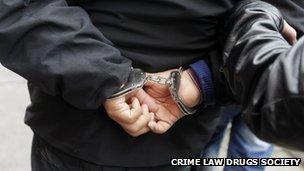Crime statistics are manipulated, says police chief
- Published

Mr Creedon's comments look set to fuel a debate on the reliability of crime data
An "obsession" with reducing crime is creating pressure on police to "manipulate" crime figures, a senior police officer has said.
Derbyshire's Chief Constable Mick Creedon said numerous officers in "many forces" had told him it was happening.
He said officers were "doing everything they can" to avoid crime going up.
Policing Minister Damian Green said a "robust" inquiry into recording practices by the Inspectorate of Constabulary would report next autumn.
On Tuesday, MPs heard claims that forces were routinely manipulating crime statistics to meet targets.
BBC home affairs correspondent Danny Shaw said it was the first time a chief constable had spoken out in this way and his comments would fuel a debate about the reliability of crime data.
Mr Creedon, who speaks for the Association of Chief Police Officers (Acpo) on organised crime, insisted the "real position" was that domestic violence and sexual violence were going up.
He said manipulation of the figures was the "unintended consequence" of pressure from police leaders, inspections and plans drawn up by police and crime commissioners to cut crime.
Addressing the Acpo conference, he said: "Inadvertently we are putting pressure on officers to do all they can to manipulate to create crime reductions."
'Manipulation unacceptable'
Peter Fahy, Greater Manchester Police's chief constable, said it was not about "fiddling" figures, but about the way forces chose to categorise various types of offence.
"There's a huge field of interpretation," he said.
Mr Fahy said it was time to move away from the police figures and focus more on the Crime Survey for England and Wales - which draws estimates of crime levels from speaking to 35,000 members of the public.
Meanwhile, Mr Green told the conference that crimes measured by the survey were falling and were less than half of the peak seen in 1995.
The minister said it would be "unacceptable" if police were found to be manipulating the data, adding the Inspectorate of Constabulary's recording practices review would report in autumn 2014.
Metropolitan Police Commissioner Sir Bernard Hogan-Howe said mis-recording crime "can never be right".
And Chief Constable Jeff Farrar, Acpo's spokesman on crime recording, insisted that "nobody joins the police service with the intention of recording crime inaccurately".
But he acknowledged that issues including a lack of awareness and knowledge, work pressures, system errors and "the possible pressure to achieve local performance targets" may all contribute to human error.
On Tuesday, Metropolitan Police constable James Patrick - who is currently awaiting disciplinary proceedings - told the House of Commons public administration committee his concerns about crime under-reporting had begun after he joined the force in 2009.
He said he had found robberies being logged as "theft snatch" in order to get them off the books.
And a former West Midlands chief inspector described practices such as recording thefts as "lost property".
Committee chairman, Conservative MP Bernard Jenkin, said he was "shocked" by the claims of such manipulation "on such a wide scale".
- Published19 November 2013
- Published18 June 2013
- Published15 November 2012